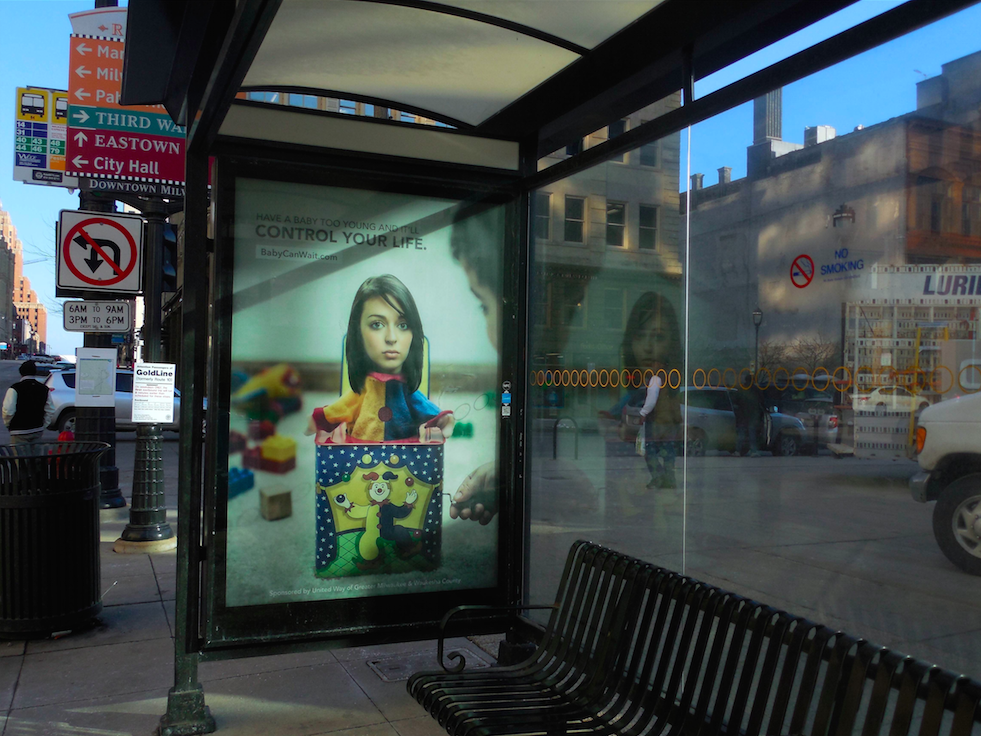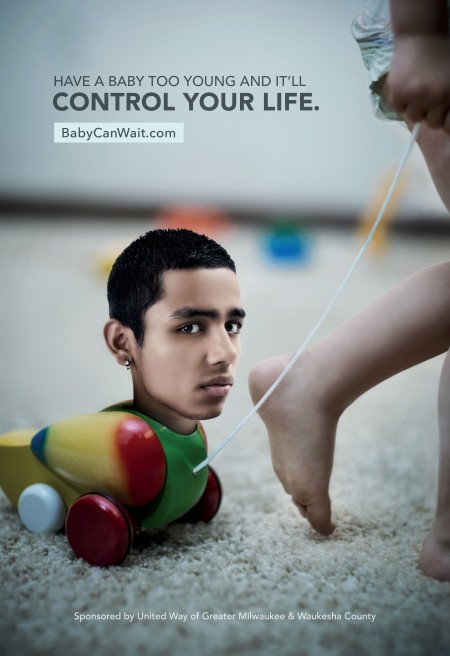Teen Pregnancy Campaign Causes Controversy
Critics call ads cruel but the campaign has reduced teen pregnancy by 56 percent.

The new ads are located at bus shelters in targeted areas and read “Have a baby too young and it’ll control your life.” (Photo by Maria Corpus)
Marquise Ward, 15, a student at Lancaster School, remembers when he found out his then 14-year-old uncle was going to be a father.
“My mom had to talk to me,” Ward said. “She said he was too young.”
When Ward saw a new ad that reads “Have a baby too young and it’ll control your life,” the message resonated with him.
The new public awareness campaign, sponsored by United Way of Greater Milwaukee & Waukesha County in partnership with Serve Marketing, shows teen parents as a hand puppet, a jack-in-the-box and a pull toy.
“The ad is basically telling [teens] a baby is not for you right now,” Euniqua Clements, 18, said after looking at the ads. “Wait until you finish and get everything you actually need, before you settle down and have a baby.”

One of three new ads posted around Greater Milwaukee. (Courtesy of United Way of Greater Milwaukee & Waukesha County)
It’s the exact message United Way hopes teens take from the ads posted throughout the city’s bus shelters. The nonprofit heads the Milwaukee Teen Pregnancy Prevention Initiative, which aims to reduce the teen birth rate with help from leaders in academics, healthcare, faith and other organizations.
“Being a parent is hard in the best of circumstances,” said Nicole Angresano, United Way of Greater Milwaukee vice president. “What we want young people to hear is that being a parent is a gift. It’s awesome … but it’s so much more rewarding when you’re at a point in your life when you have more options, more choices.”
The campaign sends a different message to two university professors who head a project called Hear Our Stories, which works to change and reshape what people think about teen parenting.
Aline Gubrium, a Milwaukee native who is now associate professor of public health and a medical anthropologist at the University of Massachusetts, and her colleague Elizabeth Krause, a professor of anthropology, take exception to the ad campaign.
“We see calling out teen parents as bad examples to other teens, as [is done] in this campaign, as harmful and cruel,” Gubrium said. “Teen parents have important stories to share and rather than stigmatizing and silencing the voices of young parents, our project gives young mothers the opportunities to share their stories.”
Krause said she realizes the campaign is not intentionally cruel, but said its visuals bully teen parents. “Depicting a man as an animal is just bad taste,” said Krause, referring to the ad showing a teen parent as a pull toy. “It’s not a campaign that has dignity.”
Angresano said the ads aren’t meant to shame people.
“The intention really is to keep a very important conversation going and that conversation’s theme is ‘wait until you’re older to become a parent,’” she said.
Rysean Pettis, 14, a student at West Side Academy II, noted the young faces in the ads and said he can’t imagine being a parent.
“I’d have to go to school and take care of the baby at the same time,” Pettis said. “I’d have to get a job.”
Gary Mueller, founder and executive creative director of Serve Marketing, said the campaign’s provocative visuals are key to making teens such as Pettis turn their heads and think twice about having unprotected sex.
“One of the things we like to do is really embed lasting images about how difficult it is [to have a baby] and how much your life will be changed,” Mueller said.
“This is not [always] a matter of two 16-year-olds getting hot and heavy on prom night,” Angresano said. “In many of these cases, adult men are preying on teenage and even younger girls.”
In 2013, the initiative surpassed its goal of reducing teen pregnancy by 46 percent. Since its inception in 2006, births to teens between the ages of 15 and 17 have been reduced by 56 percent.
The initiative’s success has become a national model, according to Mueller.
“We get calls from all over the country because we’ve created a model of how to attack a problem that’s really big and difficult to address,” Mueller said.
Currently in its ninth year, the initiative will continue to decrease the birth rate among teens in Milwaukee, according to Angresano.
“Instead of saying ‘we fixed the problem, let’s move on,’” Angresano said, “[let’s] set a new ridiculous goal, which is to cut the rate in half again by 2020.”
This story was originally published by Milwaukee Neighborhood News Service, where you can find other stories reporting on fifteen city neighborhoods in Milwaukee.






















It’s truly a shame that despite the success of this program in reducing teen pregnancy in Wisconsin’s largest county, the Republicans and their media supporters continue to peddle a story of rising and uncontrolled teen birth rates. Surely someone in the United Way organization has sufficient influence to turn around this destructive and false narrative.
Joanne Brown, I’m not necessarily disagreeing with you… but what level of teen pregnancy would you consider controlled? And where is the narrative about rising rates? I have seen commentary about Milwaukee remaining near the top of the list as one of the nations highest teen pregnancy rate cities… but that’s unfortunately a true statement, so I don’t know if we can call that “peddling a story.”
But bravo to this ad campaign though!
If anything, the ad-campaign is likely missing the mark when it comes to being SEEN by the target demo. Teens do not spend much time hanging out at county bus stops. If they ARE there, they are fully engrossed in browsing social media on cell phones while listening to music through their ear buds.
I’d challenge anyone to do a trial study. Sit on bus for an hour on a route that includes a few of the stops that feature the teen birth rate posters. When teens board at those bus stops, quickly survey them by asking if they noticed anything at the bust stop or if they had read any posters/ads in the last hour. I bet no more than 10% would mention the campaign posters and/or would be able to recite the message.
The national teen pregnancy rate has been coming down since 1993, particularly among African Americans. I don’t know the rate and rate changes for Milwaukee in particular, but there’s no proof here that the campaign is the reason, or at least the sole reason, for recent reductions in Milwaukee. There’s a difference between cause & correlation.